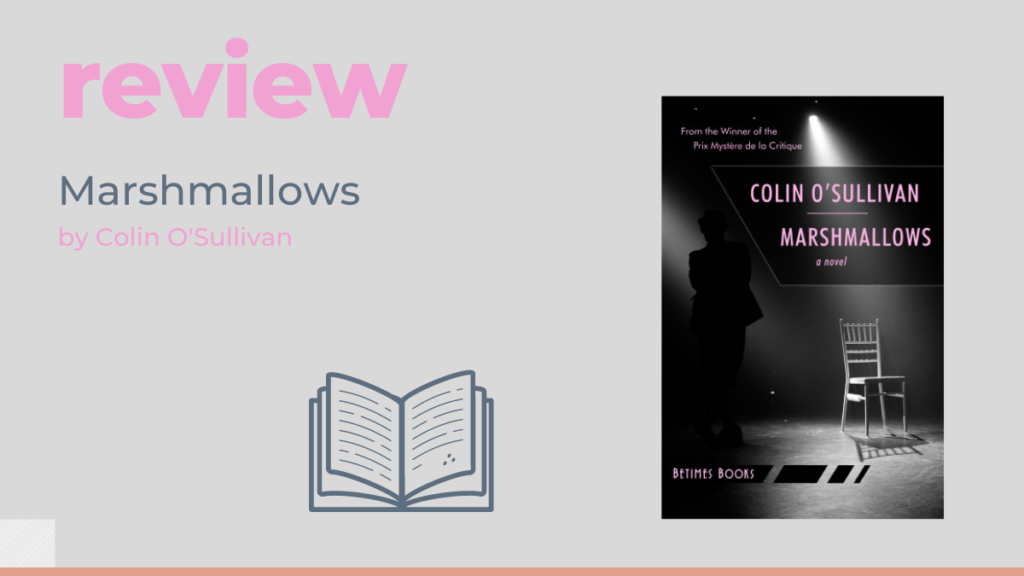
Marshmallows
Colin O’Sullivan | Betimes Books | 236pp | pb €15 | 9781916156548
Review by Eoghan Smith
Ben Morrigan, a surly, unpersonable theatre set designer of Irish descent, prepares to spend Christmas with his impressively dull boyfriend David. Together they will make the drive to visit David’s father, Charles, an aging thespian whose (not-so) glory days are long past, and Lydia, his slightly alcoholic Scottish mother. We learn that Ben and David have not been getting along for some time. In fact, they not only appear to have nothing in common but they seem to dislike each other intensely. Shadowing this domestic drama are the criminal twin brothers known as Brick and Brac, who are waiting ominously offstage for their cue. In spite of all the interminable festive music, this is evidently not a Christmas where peace and harmony will be wished to all men. This is the premise and cast of Marshmallows, the new novel by Irish writer Colin O’Sullivan.
Of course, it is not coincidental that both Ben and Charles work in the theatre. Everywhere the reader is alerted to the novel-as-drama. There is a mischievous implication that the novel may even have originally been conceived as a play, or at least that is a kind of postmodernist joke. The book, we are told, is ‘a novel’ on the cover, only for it to be described inside as ‘a play’ (though it is of course not ‘a play’—that word is crossed out), before it is re-established on the same page as a ‘novel’ by Colin O’Sullivan. This playacting signals that other allusions to drama will be found. The blurb on the jacket tells us ‘the curtain is about to be raised’, two epigraphs are quotations from Beckett’s Waiting for Godot and Harold Pinter’s The Dwarfs, and the novel itself is broken into three ‘Acts’. Perhaps to emphasis this genre-melting ambition, these Acts are divided into chapters, not scenes.There are other implied meanings of the mischievous or even sportive sense of the word ‘play’, meaning to take part in a game—a gag that is stretched out over the entire book. Much of the novel’s humour and sensibility derives from the sustained in-joke that what we are reading is not a serious study in familial relationships but a kind of game between the author and reader.
That joke turns out not to be quite so funny after all, as the novel inevitably takes the decidedly dark turn that has been foreshadowed from the outset. Pinter is a fully signalled influence on the book, not just in the relationships strained to the point of collapse between antagonistic characters from competing genders, sexualities, classes and backgrounds or in the capricious outbreak of sudden and shocking violence, but also in the repeated mentions of the content, tone and style of that playwright’s drama. As the novel progresses, the overall feeling is that both the comic and tragic elements will descend into Pinter-esque confusion and farce. The other dramatic reference point in the novel is Beckett’s Waiting for Godot (one of the characters played the boy in that play when he was younger), though if Marshmallows can be said to be Beckettian in any discernible way, it is mostly through the absurdist dynamic that gradually overwhelms the realism of the early parts of the novel. Indeed, Marshmallows, which is ostensibly set in London in 2019, dismantles the semblances of reality that are established at the beginning of the narrative.
The many implausibilities in the story, such as Ben being incongruously raised in an orphanage run by brutal Irish nuns, or a secondary character who unexpectedly and without any comprehensible motivation commits a despicable crime, or that nobody really thinks seriously about calling the police when it is the obvious thing to do, can be explained by the novel’s descent into the irrational as a self-conscious piece of art-as-artifice, where everything becomes a performance for a knowing audience. If anything, the principle characters become shallower and hollowed out of discernible psychology. This is not a new aesthetic, though it would not be a stretch to say that Marshmallows attempts at times to parody rather than imitate Pinter. Yet there is nonetheless a genuine menace and thematic purpose to all the frivolity and meaninglessness, which is delivered through prose that is always punchy and absorbing. And while the novel is increasingly filled with stagy self-referential jokes about the roles people act out in life, the theatrical unfolding of the plot, and images of pantomime violence, the novel as a whole is a reminder that human beings are often driven without apparent reason to enact sadistic forms of control over one another.
As the novel hurtles towards its final denouement—staged, inevitably, in a theatre—we are compelled to watch in a mixture of alienation and familiarity. Like many other works of the postmodernist variety, it becomes clear that everything in this playful novel is happening on the surface; there is no depth, there is no authenticity, there is no mystery. Instead, Marshmallows seem to suggest, one only has to look to see that it is on the surface where the truest form of life—the cruel performance of arbitrary power—is acted out.
***
Eoghan Smith is a writer, critic and academic.
He is the author of the novel The Failing Heart (Dedalus, 2018).











